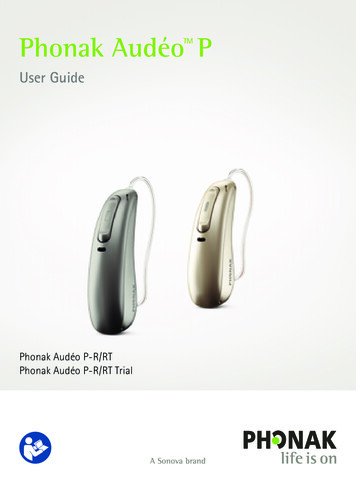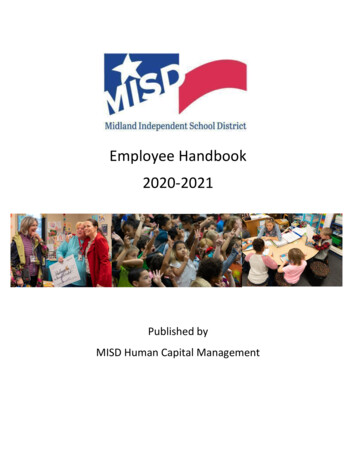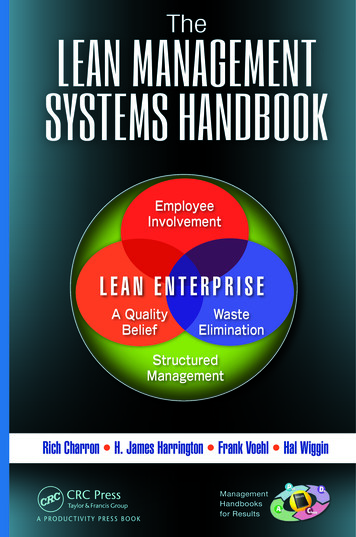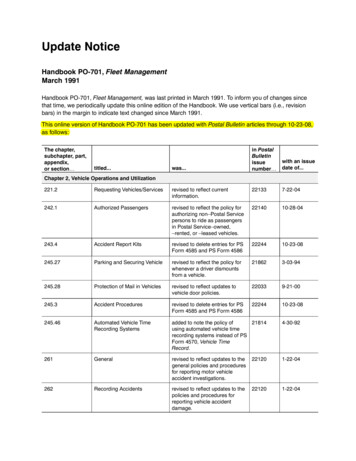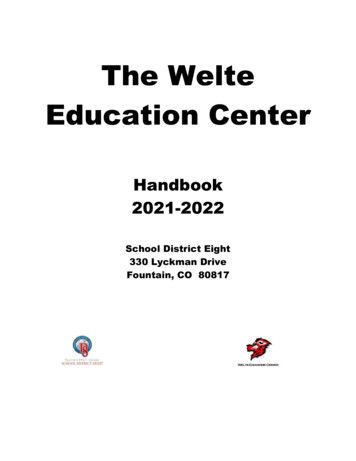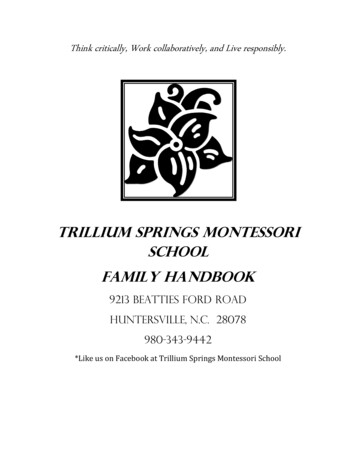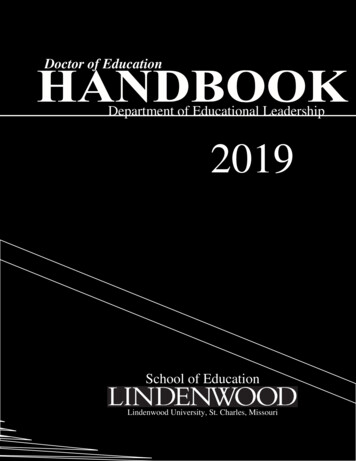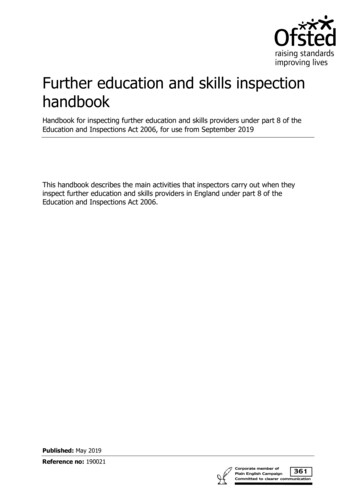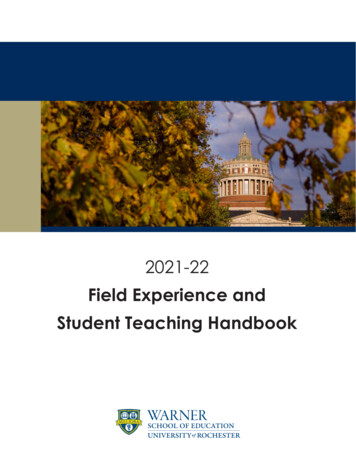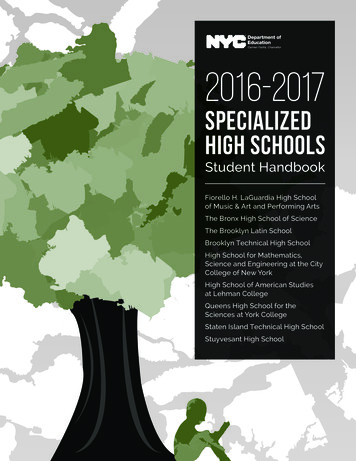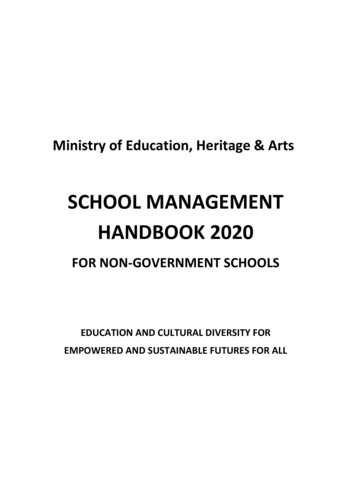
Transcription
Ministry of Education, Heritage & ArtsSCHOOL MANAGEMENTHANDBOOK 2020FOR NON-GOVERNMENT SCHOOLSEDUCATION AND CULTURAL DIVERSITY FOREMPOWERED AND SUSTAINABLE FUTURES FOR ALL
ContentsPART A SCHOOL GOVERNANCE AND PLANNING .1A1INTRODUCTION . 2A2LEGAL GUIDANCE ON SCHOOL GOVERNANCE . 3A2.1Education and the 2013 Constitution . 3A2.2The Education Act (1978) . 3A3SCHOOL GOVERNANCE ARRANGEMENTS . 4A3.1School Controlling Authority . 4A3.2School Management Committee . 5A3.3Roles of Key Stakeholders for School Governance. 5A3.4Code of Ethics for School Management Committee Members . 9A4SCHOOL PLANNING . 9PART B – FINANCIAL MANAGEMENT ARRANGEMENTS. 11B1INTRODUCTION: . 12B1.1Background, Purpose & Scope for Part B of this Handbook . 12B1.2Relevant Policies and Documents . 12B2TYPES OF SCHOOL GRANTS . 12B2.1Free Education Grant (FEG) . 13B2.2Early Childhood and Care Education (ECCE) Tuition Subsidy Grant . 15B2.3Special and Inclusive Education (SIE) Grant . 15B2.4Vocational Tuition Grant . 16B2.5Per-Capita Boarding Grant (Primary and Secondary boarding schools) . 17B2.6Remission of Fees for hostel for boarding schools. 17B3RELEASE OF GRANTS TO SCHOOLS . 18B3.1Grant Agreements with Schools . 18B3.2Grant payment conditions. 18B3.3Bank Accounts . 18B3.4Grant Payment Process . 19B4FINANCIAL MANAGEMENT PROCESSES AT SCHOOL LEVEL . 20B4.1Preparing Annual Plan and Budget. 20B4.2Processes for Receiving of Funds . 20B4.3Processes for Expenditure of Funds . 21B4.4Petty Cash and Cash Advances . 28B4.5Reporting on usage of Funds . 29
B4.6Fixed Asset Management . 30B4.7Fundraising . 31B4.8Processes to be followed for change-overs of key officers . 32B5VIREMENTS AND BALANCES OF FUNDS AT END OF THE YEAR . 32B5.1Transfer of funds between Allocation Categories (Virement of Funds) . 32B5.2Balances of Grants at the end of the Financial Year . 33B6CENTRALISATION OF SCHOOL FINANCES . 33B7OVERSIGHT OF GRANTS AND RESPONDING TO FRAUD AND CORRUPTION . 34B7.1Internal Financial Monitoring by MEHA . 34B7.2External Audit of the Annual Financial Report . 34B7.3Responding to Fraud and Corruption . 35PART C – ACRONYMS USED IN THIS HANDBOOK. 36PART D – LIST OF APPENDIXES . 37
PART A SCHOOLGOVERNANCE ANDPLANNING1
A1INTRODUCTIONBeing a member of the School Management Committee (SMC) is an extremely important position.The committee is a vital part of the school community. It provides a link between parents, the localcommunity, the school staff and the Ministry of Education, Heritage and Arts (MEHA).It is important that the community and the school are committed to the same educational visionand mission. SMC decisions should always support and promote the school’s core function toimprove student learning. Everyone is working together for the best interest of the child, and thestudents are at the centre of every decision:MEHATrustees &ManagementStudentsSchool Heads,Teachers andStaffParents andCommunityTo assist the school in achieving its educational purpose, SMC members need to develop and maintaina strong partnership with the School Head as well as with the parents and community they represent.Everyone has to work together to ensure that our children receive quality education.To function as effectively as possible, SMC members need to understand the purpose of the SMCand their roles and responsibilities as office bearers and members. The Principal, Head Teacher(known as School Heads) are the representatives of the MEHA at the school, and he/she must havea shared understanding with the SMC.Part A of this Handbook provides SMC members and other stakeholders with the necessaryinformation to understand school governance arrangements for Non-Government Schools and therole that they play.2
A2LEGAL GUIDANCE ON SCHOOL GOVERNANCEA2.1 Education and the 2013 ConstitutionThe 2013 Constitution has enshrined the right of every child to education. Section 31 of theConstitution states that:1. Every person has the right to:a) early childhood;b) primary and secondary education; andc) further education.2. The State must take reasonable measures within its available resources to achieve theprogressive realization of the right:a) To free early childhood, primary, secondary and further education; andb) To education for persons who were unable to complete their primary and secondaryeducation.3. Conversational and contemporary I-Taukei and Fijian Hindi languages shall be taught in allprimary schools.4. The State may direct any educational institution to teach subjects pertaining to health,civic education and issues of national interest. Any educational institution must complywith any such directions made by the State.5. In applying any right under this section, if the State claims that it does not have theresources to implement the right, it is the responsibility of the State to show that theresources are not available.A2.2 The Education Act (1978)The requirement for a SMC is set out in the Education Act (1978) and its subsequent amendments.Part VI, s.12 (1) of the Act states that, “The management of every registered and recognized schoolor group of schools shall be vested in a properly constituted controlling authority which shallappoint a manager and submit his/her name, and, if a manager is appointed ex-officio, his/hertitle, to the Permanent Secretary for Education, Heritage & Arts (PSEHA) for registration.”The Act states and describes the authority of the PSEHA regarding the registration of schoolmanagers. The PSEHA may register a manager or refuse to register a manager if he/she is a person“ who has been or is liable to be prohibited from managing or assisting in the management of aschool”.The Permanent Secretary shall by notice in writing, prohibit any person from managing, orassisting in the management of any school or group of schools if such person –a. has been convicted for any criminal offence, fraud or immoral behaviour;b. is an un-discharged bankrupt; orc. while he or she was school manager or assisting in the management of any school,i. permitted, employed or authorised an unregistered teacher to teach or assist in1teaching in any school;1MEHA is now responsible for the employment of all teachers and school leaders3
ii. permitted, employed or authorised a registered teacher to teach in any class, standardor form in which the teacher is not so authorised to teach;iii. kept out or refused entry to any teacher who is transferred or appointed by thePermanent Secretaryiv. misused or made unauthorised use of the grant money provided by the MEHA;v. wilfully disobeyed the direction of the PS and policies of the MEHA;vi. has infringed sections of this school management handbook.The Permanent Secretary shall have the power to register, de-register or refuse registration to aperson as school manager.A3SCHOOL GOVERNANCE ARRANGEMENTSIndividual school’s governance arrangements are set out in a School Constitution, and the SchoolManagement Committee (SMC) is required to adhere to the constitution in the management ofthe school at all times. The school constitution is of fundamental importance to good governanceas it describes the school operating procedures to ensure the smooth and efficient running of aschool. Constitutions are developed at the local level. The wording of a constitution may be variedto suit the local situation, however it should be aligned to the Model School Constitution(Appendix 1) and other relevant legislated frameworks.Each non-government school will have a controlling authority and a SMC. Further details on theircomposition and roles are set out below.A3.1 School Controlling AuthorityThe school controlling authority (or trustees) are the legal custodians of the schools. In Faith Basedschools the trustee is the organization, and the management is supported by the umbrella body. Incommunity owned schools, the trustees are the representatives of the community. There shouldbe at least three (3) Trustees of the School and teachers are not permitted to be trustees if theyare working in the school. The names of the school trustees can be found in the school registrationdocument lodged with the MEHA.Variations occur between school constitutions, and each school should refer to its constitution forthe role of the trustees. In most cases the trustees are not involved in the day to day running ofthe school. The trustees’ responsibilities generally include the following: The interim management of the School in the event of the dissolution of theconstitutionally elected SMC (e.g. for breaches of the constitution, serious problems withthe SMC, land or infrastructure developments); Facilitation of the transition between the outgoing and the newly elected SMC and Appointment of the School Manager, as per Part VI of the Education Act. The terms for replacing a trustee are governed by the Trustees Act 1966 (CAP 65). Circumstancesthat would warrant removal of a trustee include the death of the trustee, the absence of thetrustee from Fiji or being unfit to carry out their duties, as well as a range of other circumstancesset out in the Trustees Act.4
A3.2 School Management CommitteeThe term School Management Committee refers to a group of people who are elected or appointed bythe trustees as per the school constitution. They a responsible for registering the school and providingoversight in the management of the school (particularly as it applies to the school site, facilities andfinancial operations). The SMC has a collective responsibility to support the School Head in the smoothrunning of the school. SMC responsibilities fall within three key areas: Decision making; Long term planning; and Operational planning and financial management. The three areas also apply to the responsibilities of School Heads. Within each area, both partieswork together towards the educational vision, mission and goals for their school, yet the partnersplay different roles in pursuit of these aims.The composition of the SMC is determined in the school constitution. The SMC will generallyinclude the following positions:i.Chairperson/Presidentii.Vice Chairperson/ Vice Presidentiii.School Manageriv.Treasurerv.Secretary/ Assistant Secretaryvi.The School Headvii.PTFA Representativeviii.Old Scholars Representative and OthersThe school constitution specifies how members of the SMC will be elected or appointed. Allpositions listed above are voluntary (except the School Head). School managers and treasurerscannot cover multiple schools. (i.e. persons holding these positions must be entirely dedicated toone school). School trustees are not permitted to be members of the SMC and a trustee at thesame time. MEHA employees are also not permitted to be members of any SMC.All school managers should be registered on FEMIS with the MEHA. School Heads are also requiredto forward the list of all SMC members and their contact addresses to the District Education Officerand Director Finance following the AGM, a month after the meeting.A3.3 Roles of Key Stakeholders for School GovernanceThe responsibilities of the SMC Members and other key stakeholders are set out below:A3.3.1 Role of the Chairperson/ President Preside over meetings of the SMC; Call any necessary meetings of the SMC; Chair the Annual General Meeting / Special AGM; Encourage equity and encourage diversity of members of the SMC, including parents ofdisadvantaged children, people of different ages, genders and socio-economicbackgrounds; and Support SMC members in performing their duties. 5
A3.3.2 Role of the Vice Chairperson/ Vice President Assists and deputizes in the absence of the Chairperson/ President. A3.3.3 Role of School Manager Provide parents with appropriate opportunities to participate in decision-makingprocesses to develop, implement, monitor and review plans for the school’s physical andfinancial resources; Inform parents and other stakeholders of decisions concerning the school’s physical andfinancial resources; Consult with the School Heads, parents and other members of the school community toplan the maintenance and development of school buildings, facilities and resources; Ensure that the school environment is safe, OHS compliant and always well-kept; Work in partnership with the School Head to develop the strategic plan, annual plan andbudget for the school; Ensure consultation with the School Head and MEHA on inviting Chief Guests to the school; Accountable for supervising/monitoring the use of school assets and finances, ensuringthey are managed in accordance with necessary MEHA policies and guidelines inconsultation with the School Head; Certify all proposed payments and financial reports after approval by the School Headensuring that procurement processes have been followed and proper records are kept; Monitor appointment of ancillary staff using grant funds, ensuring that working conditions,leave and wages are consistent with MEHA policies in consultation with the Head of School Identify sources of funding for school capital projects; and Manage the use of school facilities for other purpose(s) ensuring that the operation of theschool is not disrupted. Where there is disruption to learning and teaching likely to occurprior approval from the PSEHA must be obtained. A3.3.4 Role of the School Treasurer Accountable for supervision/oversight of school financial management in consultation withthe School Bursar/Administration Officer who is managing finances on a day to day basis. Support the School Manager and School Head in the preparation of the Annual Plan andBudget; Ensure the School Bursar/Administration Officer maintains accurate records of all moniesreceived and paid in the name of the school; Present the audited financial statement for the previous year at the Annual GeneralMeeting; Present monthly financial reports to the SMC in collaboration with the SchoolBursar/Administration Officer; and Provide other financial planning advice to the SMC as required. The School Treasurer must have the appropriate skills and experience to be able to performtheir role effectively (eg. Qualifications in accounting/administration and/or relevant workexperience).6
A3.3.5 Role of the Secretary Maintain accurate records of the business of all SMC meetings; Prepare correspondence requested by the SMC; and Support other activities of the committee as required. A3.3.6 Role of the Head of School Overall responsible and in charge of all school education programs; Leading, guiding, monitoring, delivering and reporting of the implementation of the FijiNational Curriculum Framework and other organized school-based programs forimprovement in student performance; Provide professional guidance to teachers and parents to ensure consistent andappropriate teaching and learning practices are maintained; Communicate information about school and MEHA policies, regulations and otherexpectations to staff, managers, committee members and parents; Establishing and sustaining effective, constructive and respectful relationship within theSchool, with parents and the wider community; Ensure consultation with the School Manager and MEHA on inviting Chief Guests to theschool; Plan in collaboration with the SMC and advise the SMC of staffing and other resourcesrequired to maintain and expand the school’s educational programs. Involve staff in processes to review the allocation of the school budget and to makerecommendations to SMC for the next budget Accountable for management of school assets and finances using processes that arealigned to the rules and regulations of MEHA in consultation with the School Manager; Approve all proposed payments and financial reports in consultation with the SchoolManager ensuring that procurement processes have been followed and proper records arekept (including entry into FEMIS); Appointment of ancillary staff using grant funds, ensuring that working conditions, leaveand wages are consistent with MEHA policies (in consultation with the Manager); Monitor budget expenditure and prepare Virement Requests in consultation with SMC; and Act as the MEHA advisor to SMC. A3.3.7 Role of School Bursar/Administration Officers Accountable for carrying out day to day financial management tasks at the school, withsupervision from the Treasurer. Obtain quotations and prepare payment vouchers for proposed payments; Receipt and bank all monies received by the School; Ensure all transactions are recorded in the School financial records (updating in FEMIS); Ensure payment and other documentation is filed and available for internal monitoringand external audits; and Prepare monthly and annual financial reports and support the Treasurer in presenting tothe SMC and at the AGM. 7
The School Bursar/Administration Officer must have the appropriate skills and experience to beable to perform their role effectively. (eg. Qualifications in accounting/administration and/orrelevant work experience).Note: For smaller schools that do not have a School Bursar the responsibilities can be carried out byan Administration Officer.A3.3.8 Role of Parents/PTFAThe effectiveness of a School depends largely on the quality of the partnerships between its variousindividuals and groups. Showing mutual respect and understanding of the roles and responsibilitiesof all stakeholders is a key to developing and maintaining quality partnerships. SMCs should seek todevelop a strong partnership with the parents they represent. The role of parents/PTFAs are asfollows: Support the School Head in promoting education of their children; Attend the Annual General Meeting (AGM) and participate in discussions on the SMC’sachievements and financial management; Participate in elections for SMC positions when required; Review materials that are distributed by School Heads and SMCs (eg. Newsletters and othercommunications); and Support activities that promote communication between the school and home, and thatencourages parental involvement in the school.A3.3.8 Role of The Divisional/District Education Office Support School Heads at all times and to be the first point of call for School Heads;Coordinate activities with other Ministries and work with School Heads to implement;Communicate MEHA expectations to School Heads, SMC, and other community members;Facilitate communication between the School Community and the MEHA;Monitor, evaluate and support the appointed SMC upon the receipt of the AGM minutes; Organize awareness, induction and other capacity building programs for trustees, SchoolHeads and SMC; Consult school trustees as required; Ensure that schools comply with MEHA policies, procedures and guidelines; and Monitoring utilisation of school grants in collaboration with the MEHA Grants Audit team.A3.3.9 Role of MEHA Headquarters (including Grants Audit Team) Develop policies, procedures and guidelines for schools; Provide support to School Heads and SMCs; Monitor school data/indicators to inform policy development; Conduct monitoring to ensure consistent application policies, procedures and guidelines acrossall districts in collaboration with the Divisional and District Offices; and Conduct audits/investigations of usage of grant funds as required.8
A3.4 Code of Ethics for School Management Committee MembersSMC members are required to observe the code of ethics at all times when performing their duties.All SMC Members must sign the code of ethics upon their appointment, and the School Head willkeep a copy of this for audit purposes.1. Ensure observance of this code: A SMC Member has a duty to conduct himself or herself inaccordance with this code and therefore to keep himself or herself informed of its provisionsand any amendments.2. Avoid and/or Disclose Conflicts of Interest: So as to protect and uphold the public interest, aSMC must take reasonable steps to avoid, resolve or disclose any conflict of interest, financial ornon-financial, that arises or is likely to arise, between his or her personal interests and his or herofficial duties.3. Never take Improper Advantage or Misuse Official Position: A SMC Member should never takeadvantage of his or her position for his or her private interest.4. Ensure confidentiality: Having due regard for the right of access to official information, a SMCMember has a duty to treat appropriately, with all necessary confidentiality, all information anddocuments acquired by him or her in the course of, or as a result of, his or her appointment andduring the course of his or her official duties.5. Disclosure of Information: A SMC should only disclose information in accordance with the rulesand requirements applying to the entity by which he or she is appointed.6. Never use School Resources Improperly: A SMC Member must not use public resources, orallow such resources to be used by others, for personal advantage or benefit.7. Never receive Gifts or Benefits: A SMC must not solicit, encourage or accept gifts, benefits orfavours either for himself or herself or for another person in connection with performing or notperforming his or her official duties, contrary to any gift and benefit policy issued by theperson’s appointing authority.8. Avoid susceptibility to influence: A SMC Member should not allow himself or herself to be put,or appear to be put, in a position of obligation to return a favour to any person or body. Norshould his or her conduct in his or her official capacity or in his or her private life make him orher susceptible to the improper influence of others.9. Always Act Lawfully: A SMC Member should carry out his or her duties in accordance with theConstitution and all laws, and with those lawful instructions and ethical standards and with theschool constitution which relate to his or her functions.10. Ensure respect for persons: A SMC Member is to treat everyone with respect, courtesy and in afair and equitable manner without harassment, victimisation or discrimination in accordancewith section 26(3) of the Constitution.11. Ensure respect for rights: In the performance of his or her duties, a SMC member should notact arbitrarily to the detriment of any person, group or body and should have due regard for therights, duties and proper interests of all others.A4SCHOOL PLANNINGSchool Heads, Managers and Committees engage in planning in different ways but with a sharededucational purpose. While the focus of planning by the School Head and the staff is on the School’s9
teaching and learning programs, Managers and Committees focus their planning on themaintenance and development of school resources, buildings, facilities and finances. However, theSMC should be aware of the progress of students and work with the School Head and thecommunity to address the challenges, they need to ensure when budgeting that they are buyingother resources needed for the classroom.Bringing the two planning activities into a single school plan will help to ensure that all decisionsconcerning the school’s educational programs, physical and financial resources are linked directlyto the achievement of the school’s vision, mission, goals and priorities. To ensure thiscomprehensive approach to planning the School Head and SMC will work together to prepare aMaster School Plan. The plan should include the following: The school’s vision, mission, educational goals and priorities, considering targets for schoolattendance, reducing chronic absence, retention of students and achievement of educationaloutcomes. The key strategies to achieve the educational goals and priorities; (e.g. improving exam results,supporting all students individually in the School) The School’s buildings and facilities plan; The allocation of physical and financial resources to the School’s educational programs andfacilities; The link between the school plan and the MEHA’s Strategic Plan; The School’s annual operational plan; and A budget for implementation of the annual plan.The Master School Plan shall be endorsed by the School Head, School Manager and district senioreducation officers in order to demonstrate accountability to the school community, controllingauthority and alignment to MEHA plans and policies.Each School will need to determine its own planning cycle and timeline, however, it is expectedthat a School will review its plan annually to monitor progress towards attainment of the goals andwill agree on the priorities and budget for next year.10
PART B – FINANCIALMANAGEMENTARRANGEMENTS11
B1INTRODUCTION:B1.1 Background, Purpose & Scope for Part B of this HandbookFinancial Management in MEHA is a critical area for policy makers, education administrators,teachers, SMCs, parents and the public at large. It is a critical component for optimum utilization offinancial resources to support learning and teaching in schools. Management of finance is notmerely about money, income and expenditure, budgeting or costing but involves a critical processof relating to resources in order to achieve the desired results of all students receiving a qualityeducation while ensuring transparency and accountability.The continued provision of the Free Education Grant requires all stakeholders to be aware of theneed to achieve increased efficiencies and effectiveness with public funds. Further strengthening ofaccountability requirements in this Handbook will assist in realising these efficiencies whilstmaintaining improvement of the learning and teaching in schools.The SMC and School Head are both accountable for ensuring that the school financial managementprocedures meet the MEHA’s requirements. Both parties have a legal obligation to the Government,MEHA, the controlling authority and parents in the effective management of school funds.Part B is intended to assist SMCs and School Heads for Non-Government Schools in managing thegrants provided by MEHA. The purpose of the chapter is as follows: Provide information on the types of grants provided to schools, including the conditions foreligibility; Provide guidance on the financial management policies, procedures and processes to befollowed when managing school grants; and Provide forms and templates to be used when managing school grants. The financial policies, processes and procedure
Management Committee (SMC) is required to adhere to the constitution in the management of the school at all times. The school constitution is of fundamental importance to good governance as it describes the school operating procedures to ensure the smooth and efficient running of
